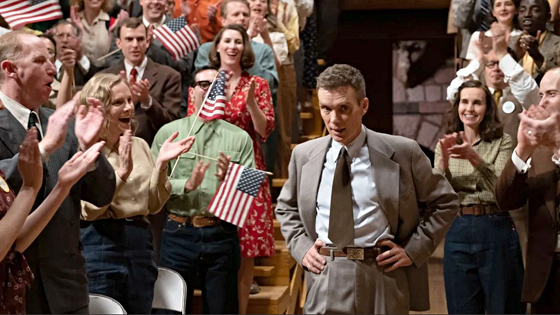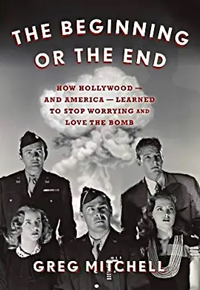Reprinted with permission from Greg Mitchell’s newsletter Oppenheimer: From Hiroshima to Hollywood.
My appearance on Democracy Now! yesterday morning led to a lot of social media interest and links and inquiries. Happy to continue to talk to old and new audiences as (maybe) Oppenheimer drives fresh interest and (maybe) compelling activism. On one zoom chat with about 75 antinuclear activists and experts one of the attendees was the daughter of Stanley Kramer, director of the earliest big-budget Hollywood movie (Gregory Peck, Ava Gardner) depicting the end of the world due to nuclear bomb blasts, On the Beach. Nice that I got another invite from Amy Goodman, as I had been on the show just a couple of months back around my PBS film Memorial Day Massacre and book.
And here’s a new audio interview with me just posted at the great books site, LitHub. Also got a couple of nice shout outs from my old Nuclear Times colleague (1982-1985) David Corn at Mother Jones in his newsletter today, don’t miss it.
Yesterday I posted the 14-minute segment from the Democracy Now! show but we kept talking post-show and now they’ve published that 41-minute bonus which delves deeper but also much wider.
In one of those segments, I mentioned my Atomic Cover-up book and film and I received quite a few inquiries about them afterward. For more on that, go here. It’s the story of what happened at the other end of Oppie’s bomb that really first got me obsessed with the atomic bombings (and aftermath) back in….1982.
My complaints about omissions in Oppenheimer have circulated and been discussed widely on the intertubes since I saw the screening ten days ago and started my postings here. My media appearances yesterday sparked a new round. Some, of course, are rather week while others have some, or a lot, of merit. But to point to two here:
– There is the claim that the reason we don’t see any images of the dead or damaged in Japan is because the film is told exclusively from Oppie’s perspective or “through his eyes,” as Nolan himself has put it. The Father of the Bomb was not in Japan to witness any results so the “tone” would be wrong to show them.
Now there are at least two problems with this: 1) much (actually far too) of the movie actually focuses on Robert Downey’s Strauss, with Oppenheimer far off stage, at least physically, and 2) we do see Oppie viewing footage from the atomic cities but from the side and we don’t see the screen at all. If the movie was really “from his perspective only” or “through his eyes,” Nolan could have easily swung the camera behind him to show us what he was looking at and slightly reacting to. David Corn also writes about this today.
My hunch is that Nolan and his team thought long and hard about this decision. Did they believe that gruesome footage would stand as too much of an indictment of Oppenheimer and undercut the audience’s sympathy for him? The absence of the Japanese dead in Oppenheimer reinforces their position as the Other.
– Another popular counter is that movie is a bio-pic, “not a documentary.” It’s about his entire life. And: “read the title.” Nolan himself has called Oppenheimer the most important man who ever lived. But question: What makes that true (if it is true, or even close to it)? Hint: Maybe something he helped invent? It sure wasn’t his affair with Jean, or struggles with Strauss or losing his security clearance. So wider exploration of what that invention destroyed or produced (e.g. radiaoactive fallout), and that tragic legacy, would seem in order. Especially in this “bio-pic.”
I have praised the movie for accuracy in most cases but did you spot the flags being waved in this celebration – with 50 stars when there were only 48?

My wife found this weekend a fascinating new article at the venerable New York Review of Books. It’s fully behind a pay wall so I’ll have to describe it and excerpt it here. It’s written by Martin Filler, a cousin of I.I. Rabi, who has a key role in the Nolan film (played by beefy David Krumholz). Rabi was a winner of the Nobel Prize (which eluded Oppenheimer), who refuses to work on the bomb but advises his old pal Oppie throughout and witnesses the Trinity test. Filler even attends a screening with one of Rabi’s daughters. Has to laugh at this, and agree:
Although similarly short – five-feet-six to Rabi’s five-feet-four – he’s much heavier than our compact and sturdily built relative ever was. And although the actor schvitzes too much at dramatic junctures, he does convey Rabi’s earthy directness and puckish vitality. At least the role didn’t go to Jonah Hill or Seth Rogan.
In a more serious vein:
The fact is that Oppenheimer was not the high-minded martyr of personal conscience – a modern-day Thomas More – that his legend would have us believe. Late and soon he craved establishment validation….During the proceedings he compounded those suspicions by naming names of suspected Communists to the very body that was unjustly purging him. He rationalized the betrayal by claiming he had originally concealed their identities to protect them. He thereby blighted the lives of several people – including a German refugee physicist, Bernard Peters, who had been in Dachau, and Haakon Chevalier (played by Jefferson Hall), a fellow Berkeley professor with whom he established the school’s branch of a teachers’ union before World War II.
Oppenheimer even posthumously implicated Tatlock, a Communist psychiatrist whom he met in Berkeley in 1936 and who was, according to a mutual friend, his “truest love.” In 1944, a year after they resumed their affair during his marriage to Kitty, Tatlock committed suicide at twenty-nine. At the hearing he threw in for good measure the names of her friends who were Communists or fellow travelers. It was only because his security clearance was revoked at the end of the show trial that he is now seen principally as a victim of McCarthyism, and thus escaped obloquy akin to that heaped on the theater and film director Elia Kazan, who had informed on colleagues to the House Un-American Activities Committee two years earlier. Oppenheimer notes, in voice-over, the damage done by the physicist’s revelations, and we briefly see clips of his erstwhile friends wandering around absentmindedly, but that slighting acknowledgement seems almost offensive in its brevity.

Seventy-seven years ago this week, and little more than a year after Trinity: Our second nuclear test in the Pacific, “Baker,” was set off underwater. Of the ninety-two “junked” vessels nearby, all but two either sank, were damaged, or suffered heavy contamination. A six-thousand-foot column of radioactive water sprayed observer ships and their crews; some likened it to “a witch’s brew.” Vice Admiral W.H.P. Blandy, who was in charge of the operation, declared the bomb “a form of poison warfare” after he was unable to inspect many of the ships due to the wildly clicking Geiger counter that accompanied him.
In a sign of things to come, radioactive particles were detected over San Francisco a few days later, and after that over Paris, bringing this “fallout” threat to wide public attention for the first time. Also endangered were the forty thousand U.S. sailors and soldiers who had been crowded cavalierly nearby, or who mounted the ships later to inspect or clean them – with safety guidelines widely ignored – and were exposed to troubling levels of radiation.
Testing, One, Two, Three…and then…
Time-lapse of every atomic/nuclear explosion starting in 1945…
Thanks for reading Oppenheimer: From Hiroshima to Hollywood! Subscribe for free to receive new posts and support my work.
Greg Mitchell is the author of a dozen books, including “Hiroshima in America,” and the recent award-winningThe Beginning or the End: How Hollywood – and America – Learned to Stop Worrying and Love the Bomb, and has directed three documentary films since 2021, including two for PBS (plus award-winning “Atomic Cover-up”). He has written widely about the atomic bomb and atomic bombings, and their aftermath, for over forty years. He writes often at Oppenheimer: From Hiroshima to Hollywood.





Jun 28, 2023 How would a nuclear war between Russia and the US affect you personally?
What would happen if a nuclear war were to be sparked between Russia and the United States today? Who would survive?
https://youtu.be/-xthzy1PxTA